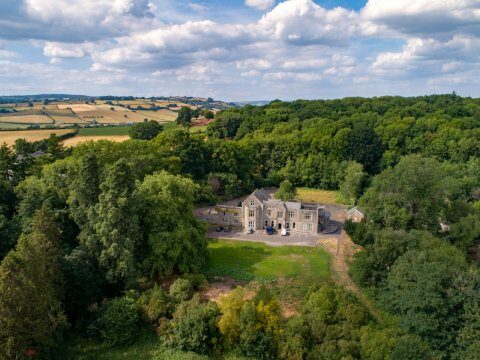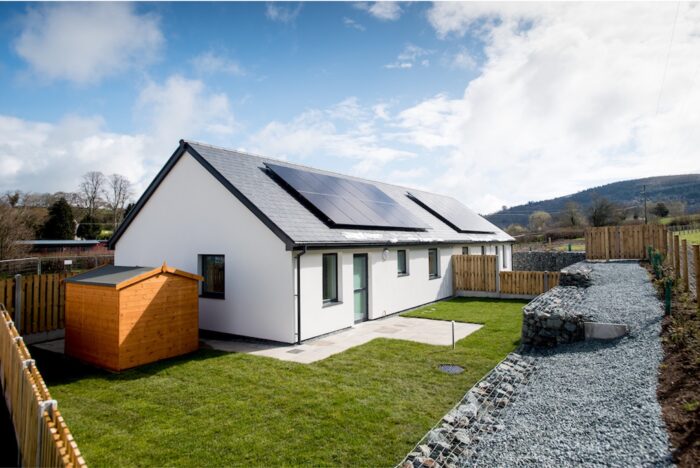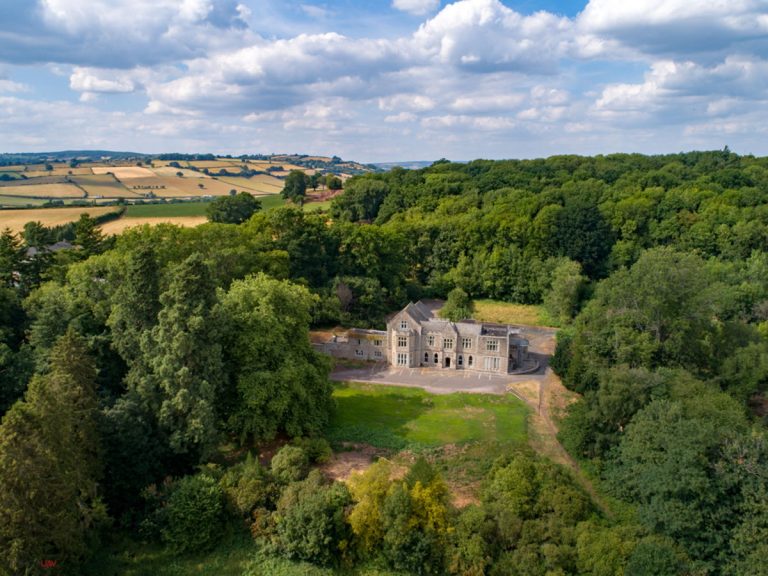The world around us is constantly changing. New ideas and technologies emerge all the time, shaping the way we live, whether in the rural or urban areas of Mid Wales and Shropshire, the buildings we live and work in need to evolve along with us. And that's where architectural professionals like us at Hughes Architects play a vital role.
The Royal Institute of British Architects (RIBA), of which we are a member, has recently created a roadmap called Horizons 2034.
It will ensure we are ahead of new trends in construction as well as upcoming legislation or identifying funding opportunities. It focuses on four key areas that will transform the way we interact with our homes and workplaces.
• A Greener World: Buildings play a huge part in protecting our environment. Architects are finding smarter ways to design with sustainability in mind, reducing energy use and creating healthier living spaces. • Smart Investments: New technologies and construction methods are making buildings more efficient and long-lasting. This means future-proofed designs that hold their value and save you money in the long run. • Space for Everyone: Architects are finding clever ways to use space efficiently as our communities grow. This means buildings that make living and working in busy places more convenient and enjoyable. • Innovation at Work: From smart materials to advanced construction techniques, technology is changing the way we build. This leads to more functional spaces that adapt to our needs.
What does this mean for our clients?
“At Hughes Architects, we see RIBA Horizons 2034 as an exciting framework," said Doug Hughes, Managing Director and Principal Architect. "By staying at the forefront of these ideas, we design buildings that are beautiful and improve your quality of life and investment.
"Being part of the RIBA Horizons 2034 conversation ensures we're delivering the most forward-thinking designs for our clients. This translates into homes and workspaces that enhance daily life, protect their investment, and remain adaptable to changing needs."
Richard Lewis, Director and Architect, added: "RIBA's focus on sustainability, economics, changing populations, and technology fits well with our commitment to creating spaces that work for generations to come.
Richard Lewis, Director and ArchitectWhile we’re excited to be involved in the Horizons 2034 programme, it will only build on our already strong emphasis on designing sustainable and environmentally sensitive buildings in both residential and commercial environments.
He added: “The four themes identified by RIBA Horizons 2034 – the environmental challenge, the economics of the built environment, population change, and technological innovation – are all critically important considerations us working in both rural areas of Mid Wales and Shropshire, as well as the urban towns and communities.
By engaging with these themes, we can ensure that our designs are fit for the future.”
How does this translate for rural communities?
While RIBA Horizons 2034 doesn't have a specific focus on rural communities, its key themes and considerations can significantly impact them, according to Doug Hughes.
"RIBA Horizons 2034 fits perfectly with our vision of designing for a sustainable future in rural communities such as those in Powys, Ceredigion, and Shropshire. We believe that architecture can enhance the environment, support local economies, and create spaces that bring people together.
“However, isn't just about the future; it's about finding ways to move forward while respecting the unique character of rural communities. We're excited to design buildings that blend modern solutions with a respect for tradition."
Environmental Challenge and Sustainable Design
Climate resilience Rural communities are often more vulnerable to the effects of climate change, such as extreme weather events. Sustainable design and building practices promoted by Horizons 2024 can help create more resilient infrastructure and housing in rural areas.
Protecting natural resources Rural areas are vital for biodiversity and resource conservation. Architects embracing Horizons 2034 principles can design projects that integrate with the natural environment, respecting local ecosystems.
Renewable energy Rural communities have great potential for renewable energy generation (wind, solar, biomass). Architects can play a role in designing buildings and infrastructure to incorporate these technologies.
Economics of the Built Environment
Affordability and accessibility Rural communities often face housing shortages and affordability issues. RIBA Horizons 2024 encourages innovative construction methods and material use that could translate into more cost-effective buildings in rural areas.
Local economic development Well-designed public spaces, community buildings, and commercial areas can attract businesses and boost economic development in rural areas.
Infrastructure investment Horizons 2024 indirectly promotes the need for better investment in rural infrastructure. This could include broadband access, transportation links, and community facilities.
Population Change
Changing demographics Rural areas can experience both population decline and the influx of new residents seeking different lifestyles. Architects focused on the themes within Horizons 2034 can help design adaptable buildings and public spaces that cater to diverse population needs.
Housing for mixed populations Rural communities need to accommodate aging populations as well as younger generations. Architects engaged with Horizons 2034 principles are more likely to design spaces suitable across age groups.
Preserving rural heritage Architects can play a key role in sensitively modernizing rural areas while maintaining their unique character and heritage value.
Technological Innovation
Closing the digital divide Technological innovations highlighted by Horizons 2034 could help bridge the connectivity gap between rural and urban areas, providing better access to services and resources.
Smarter infrastructure Smart technologies can improve energy efficiency, waste management, and the delivery of public services in rural communities.
Supporting rural industries New technologies are transforming traditional rural industries like agriculture and forestry. Architects can design buildings and infrastructure that support these innovations and boost economic development.
Choosing an Architect for the Future
When choosing an architect for your home or commercial project, you should ask about their awareness of the latest trends and technologies.
Architectural professionals such as those at Hughes Architects who are engaged with programmes like RIBA Horizons 2035 will be better equipped to deliver a building that meets your current needs while also anticipating future ones.
Richard added: “Here at Hughes Architects we’re committed to designing buildings that are sustainable, resilient, and meet the needs of future generations. We believe RIBA Horizons 2024 will be a valuable resource in helping our team achieve this goal.”
You can contact us to talk about your architectural or planning ideas by emailing enquiries@hughesarchitects.co.uk or telephoning 01686 610311 or 01938 55 3436.
Or visit us at 18 Berriew Street, Welshpool, or 29 Broad Street, Newtown.



